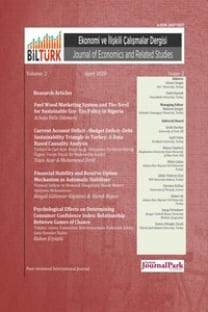Current Deficit and Gdp of Energy Consumption Effect on Items: 1998-2021 Example of Turkey
Çalışmamızın konusu enerji tüketiminin cari açık ve GSYİH kalemleri üzerindeki ekonomik ilişkisidir. Temel amacımız; 1978 yılından bu yana birçok iktisatçının üzerinde araştırmalar yaptığı enerji tüketimi ve makroekonomik göstergeler arasındaki ilişkinin hem teorik hem de ampirik çerçevede incelenmesidir. Çalışmada Türkiye 2000-2018 yıllarını kapsayan dönem için enerji tüketiminin cari açık ve GSYİH kalemleri arasındaki nedensellik analiz edilmiştir. Bu amaçla söz konusu ülkenin kişi başı reel GSYİH, enerji tüketimi ve cari açık göstergelerinin arasındaki uzun dönemli ilişki birim kök testleri, Johansen eş-bütünleşme ve Granger nedensellik testleri kullanılarak incelenmiştir. Analiz sonucunda, yokluk hipotezi reddedilmektedir. Değişkenler arasında herhangi bir Granger nedensellik ilişkisi tespit edilememiştir. Ancak enerji tüketiminden GSYİH’ya doğru tek yönlü Granger nedensellik ilişkisi tespit edilmiştir. GSYİH’dan enerji tüketimine doğru Granger nedensellik ilişkisi tespit edilememiştir. Benzer şekilde enerji tüketiminden cari açığa doğru tek yönlü Granger nedensellik ilişkisi tespit edilirken, cari açıktan enerji tüketimine doğru Granger nedensellik ilişkisi tespit edilememiştir.
Anahtar Kelimeler:
Enerji Tüketimi, GSYİH, Granger Nedensellik İlişkisi
Current Deficit and Gdp of Energy Consumption Effect on Items: 1998-2021 Example of Turkey
The subject of our study is the economic relationship of energy consumption on current account deficit and GDP items. Our main aim is; It is the examination of the relationship between energy consumption and macroeconomic indicators, on which many economists have been researching since 1978, both theoretically and empirically. In the study, the causality between the current account deficit and GDP items of energy consumption for the period covering the years 2000-2018 in Turkey was analyzed. For this purpose, the long-term relationship between real GDP per capita, energy consumption and current account deficit indicators of the country in question was examined using unit root tests, Johansen cointegration and Granger causality tests. As a result of the analysis, the null hypothesis is rejected. No Granger causality relationship could be detected between the variables. However, one-way Granger causality relationship from energy consumption to GDP has been determined. Granger causality relationship from GDP to energy consumption could not be determined. Similarly, one-way Granger causality relationship from energy consumption to current account deficit was determined, while Granger causality relationship from current account deficit to energy consumption could not be determined.
Keywords:
Energy consumption, GDP, GRANGER CAUSED RELATIONSHIP,
___
- Akarca, A. ve Long T.V. (1980), “On the Relationship Between Energy and GNP: A Re-Examination”, Journal of Energy and Development, 5, 326-331.
- Altınay, G. ve Karagöl, E. (2005), “Electrictiy Consumption and Economic Growth: Evidence From Turkey”, Energy Economics 27, 849-856.
- Erol, Ü. ve Yu, E.S (1987), “Time Series Analysis of the Causal Relationships Between US Energy and Employment”, Resources Energy, 9, 75-89.
- Ertuğrul, H. M. (2010), Türkiye’de Enerji Sektöründeki Yapısal Reformların Enerji Verimliliği Üzerine Etkileri, Enerji, Piyasa ve Düzenleme, 1, (2) , 145-171.
- Ghosh, S. (2002), “Electricity Consumption and Economic Growth in India”, Energy Policy, 30, 125–129.
- Granger C. (1988), “Causality, Cointegration and Control”, Journal of Economic Dynamics and Control, (12), 551-559.
- Granger, C.W.J. (1969), Investigating Causal Relations by Econometric Models and CrossSpectral Methods, Econometrica, 37.
- Gujaratı, D.N (1999), Temel ekonometri, çev. Ü. Şenesen ve G.G. Şenesen, İstanbul, Literatür Yayınları.
- Işığıçok, E. (1994), Zaman Serilerinde Nedensellik Çözümlemesi. Bursa: Uludağ Üniversitesi Basımevi.
- Yayın Aralığı: Yılda 4 Sayı
- Başlangıç: 2019
- Yayıncı: Fatih DEYNELİ
